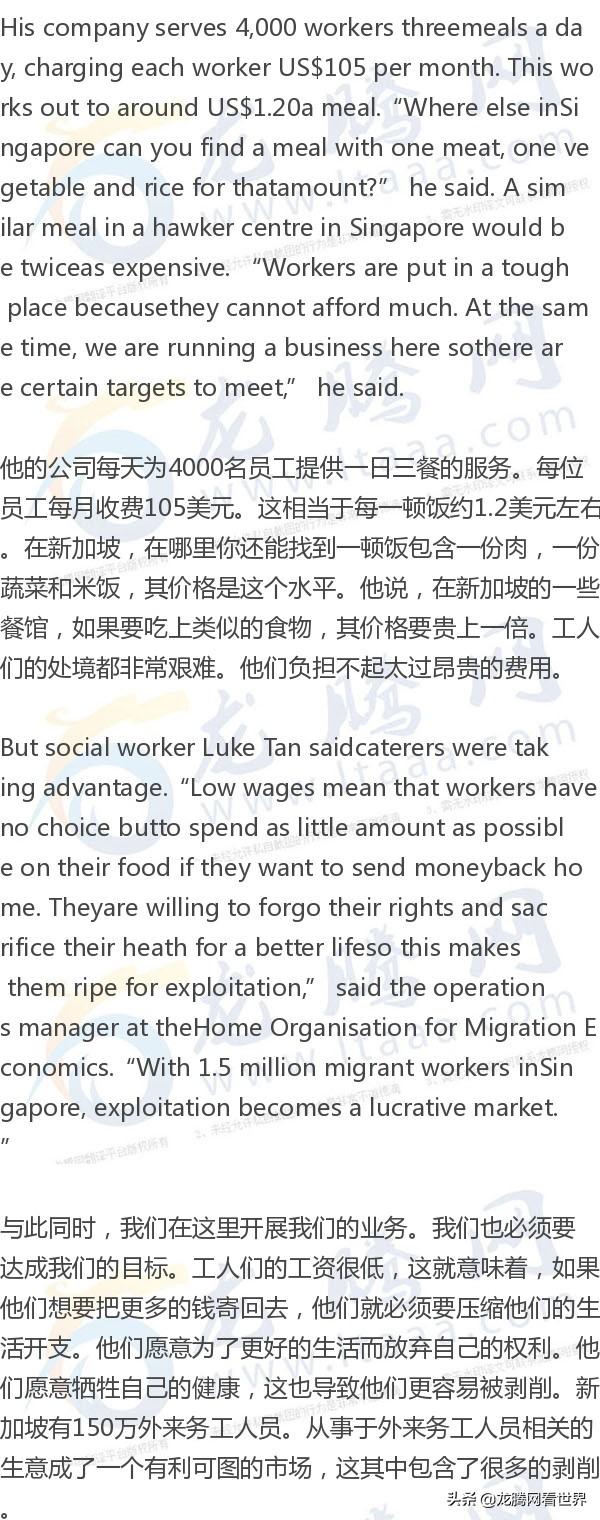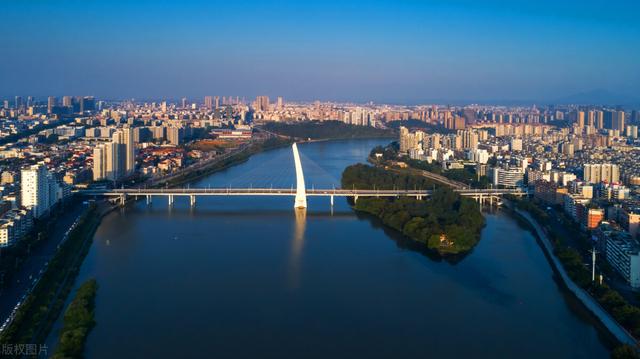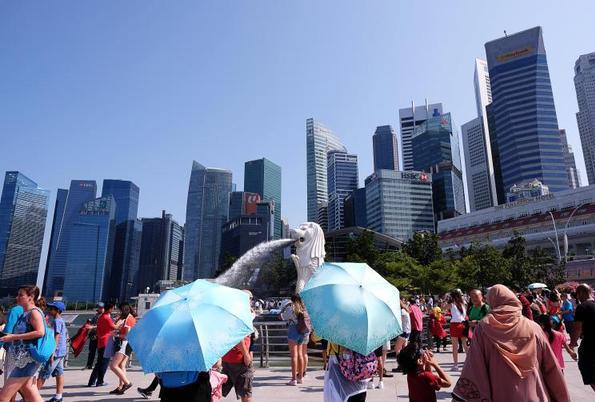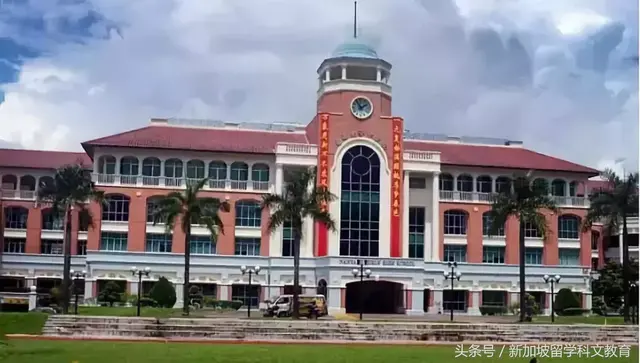【龙腾网】在富裕的新加坡,为何很多短期工人是在饿着肚子工作?

Labourers from Bangladesh at a coffeeshop in Singapore’s Little India district. Photo: Reuters
上图:工人来自孟加拉国,他们住在新加坡的小印度区,他们在一家咖啡店上班
Whenever Mominul Hassan calls his wifeand two children back home in Bangladesh, he makes it a point to disable thevideo call function on his phone so that they will not be able to see him.This,he says, is the only way to ensure that they never find out how much weight hehas lost since coming to work in Singapore as a construction worker eight yearsago. “If my wife sees me, she will worry and ask me to come home. I misshome but I also need to earn enough money before I can return,” he said.Hassan,32, weighed 65kg when he arrived here. Today, he is only 55kg – a dip caused bya lack of proper food and nutrition, he said.Hassan is not alone. In one ofAsia’s most developed countries, where food wastage is a national problem,migrant workers are going hungry because of low wages and a highly competitivefood catering industry that capitalises on the willingness of workers to scrimpand save for a better life.
每当摩尼纳尔.哈桑给他孟加拉国的妻子打电话的时候,他都会关掉手机上的视频通话功能。如此一来,他的妻子和他的孩子们便看不到他了。按照他自己的说法。他之所以要这样做,是不希望让他的家人们知道他在新加坡当建筑工人的状况。自从他来到新加坡当建筑工人,他的体重已经减少了很多。他对我们说,“如果我的妻子看到我现在的样子的话,她一定会担心的。然后他会让我回家。”他对我们说他很想回家,但是他希望那是在他赚了足够多的钱以后。哈桑现在已经32岁了,他来到新加坡的时候,体重是65公斤。现在,他的体重只有55公斤。这主要是因为当地缺乏合适的饮食,这造成他营养水平下降。哈桑绝对不是个例。新加坡是亚洲最发达的国家之一。新加坡食品浪费是一个全国性的问题。但是,很多工人在新加坡却正在挨饿。这主要是因为工资很低,餐饮业竞争激烈。很多工人节衣缩食,他们想要为了更好的生活去存储一些钱财。他们的这一意愿非常强烈,餐饮业充分的利用了这一点。
LOW WAGES, FEW OPTIONS
World renowned for its meticulousplanning and distinct skyline that featured in the Hollywood hit film CrazyRich Asians, Singapore depends on a large pool of blue collar migrant workersfrom countries like India, Bangladesh and Myanmar to power its building andconstruction sector, which was valued at nearly US$22.5 billion in 2018.
新加坡有着亚洲非常独特的天际线。在好莱坞的大片当中,出现了很多富裕而疯狂的亚洲富人。但是,新加坡的富裕却是由很多蓝领工人所支撑起来的。这些工人主要来自于印度,缅甸和孟加拉国。这些工人主要从事建筑方面的工作。在2018年,他们在新加坡创造了225亿美元的产值。

But ina country with no minimum wage, migrant workers take home just US$13-15 dailyfor back breaking work that usually lasts from 10 to 12 hours a day, dependingon the scale of the project.As a result, most workers do not mind clocking inextra overtime hours to supplement their income. With barely enough time and cash tospare, they turn to caterers as a no-frills and cheap solution for their dailymeals.On paper, it seems a good deal. For US$90-US$110 a month, they get threemeals a day delivered straight to their dormitories and work sites.
但是新加坡是一个没有最低工资标准的国家。那些外来务工人员每天只能挣13到15美元。他们每天要工作10到12个小时,这些工作都是非常繁重的体力劳动。具体劳动强度要取决于项目建设的规模。很多工人并不介意通过加班来增加他们的收入水平,工人没有足够的时间和金钱来改善他们的饮食。所以他们只能求助于那些餐饮公司。这些廉价的餐饮公司,为他们提供廉价的日常膳食。从表面上来看,这似乎是一个非常平等的买卖。他们每个月支付90美元到110美元。如此一来,他们就能够得到一日三餐的服务。这些饮食会定时定点的送到他们的工作地点。

Exposed to Singapore’s heat andhumidity, the food often succumbs quickly in the open.“The food always arrives fresh butby the time I eat it, it has already become bad. Usually I will throw awayabout half of the rice because I cannot eat it any more,” said Hassan.
Ironically, the workers are alsocontributing to Singapore’s food waste problem.
LACK OF STORAGE
The food packages are usually left inboxes in the open, because there is a lack of proper food storage areas neardormitories and work sites.As a result, workers told This Week in Asia it isnot uncommon to find stray dogs and rats getting to the food packets beforethem. Duringmonths of monsoon rain, the food is soaked and inedible.To get by, workersoften forgo meals altogether. Others turn to caffeine-enhanced energy drinks toperk themselves up and to eliminate hunger pangs.Indian national A. Rajah, whohas lived in Singapore for seven years, says that even though he is well awareof the long-term side effects of energy drinks, such as increased bloodpressure and diabetes, he has little choice. “It’s cheap and the sweetaftertaste helps to keep me awake,” he said. “But I’m not the only one. If youwait outside worker dormitories in the morning, you will see piles of energydrink cans.” For workers who live in dormitories equipped withadequate cooking facilities, the situation is only slightly better. While theycan cook their own meals, the supermarkets in dormitories usually charge higherprices for their goods compared to those elsewhere.
那些食物暴露在新加坡湿热的环境当中,食物很快就会变质。哈桑说,食物刚开始的时候是新鲜的,但是,当我们开始去吃的时候,很多已经变馊变坏了。所以,通常我们都会扔掉一半的食物。因为我们再也吃不下那些已经变馊变坏的食物。具有讽刺意味的是,这些工人助长了新加坡食品浪费问题。因为食品包装缺乏,导致很多食物暴露在空气当中,没有合适的场所来存储这些食物。当地的工作人员告诉我们,在很多时候,当地的流浪狗和老鼠会抢在工人之前去吃那些食物。这种状况并不罕见。在新加坡的雨季里面,通常会持续几个月的时间。那些食物通常都会被浸泡过,导致食物无法被食用。为了维持生计,工人们通常都会饿着肚子,他们会选择不吃饭。另外一些人会喝含咖啡因的饮料来提神。他们希望通过这种方式来消除他们的饥饿感。拉贾在新加坡生活了七年,他是一名印度人,他说他非常清楚那些能量饮料的副作用,那些饮料会导致血压升高,而且会导致糖尿病,但是他别无选择。这些能量饮料很便宜,而且非常美味。这些饮料的味道让我保持清醒。他告诉我们,他并不是唯一一个这样做的人。如果你早上在工地门口站着去观察的话,你会看到成堆的饮料罐。有些宿舍里面会配备一些烹饪设备,在这些地方,情况可能会略有好转。他们可以自己做饭,但是,与其他地方相比,那些宿舍里面的超市通常都会对商品收取很高的价格。
“The nearest supermarket is veryfar away and by the time we all get back at the end of the day, we are all verytired,” said R. Velmurugan, from India.“Every minutethat we get to rest is important so we have no choice but to buy from thesupermarket in the dorm even though it is expensive.”
CATERERS struggle, too
最近的超市离我们很远。等我们下班回来的时候我们都已经很累了。威尔莫.鲁根说,每一分钟的休息时间对于我们来讲都非常重要。我们别无选择,所以我们只能在超市里面买东西。尽管那些东西都很贵,我们依然不得不如此。
餐饮业激烈的竞争:
With 1.5 million foreign workers inSingapore, the food catering business that serves them is lucrative. To edgeahead, firms slash prices knowing the customers are very price sensitive.Quality invariably suffers.“Similar to any other industry, the more you pay, the better thequality. It is not the fault of the caterers or the workers,” said SukkurMaideen, 47, who manages a canteen and a supermarket at a dormitory. Caterersdo not have it easy either. To meet demand, kitchen operations run 24 hours aday, every day of the year. The labour intensive business chalks up heavy costsfor logistics, fuel and manpower and Singapore is expensive. Margins are thin.
有150万外国工人在新加坡工作,新加坡当地的餐饮业服务这些外国劳工,这明显是有利可图的事情。为了抢占先机,很多公司会选择降低价格。他们知道客户对于产品的价格是非常敏感的。质量当然也会是其中的一个因素,和任何行业一样,如果你想要更高的质量的话,你必须要支付更高的价格。苏库尔.麦迪恩在宿舍里面管理着一家餐厅和一家超市。餐饮公司的日子也不太好过。为了满足人们的需求,厨房每天24小时都在营业。这是一个劳动密集型的企业,无论在物流,燃料和人力成本方面,其支出都是非常高昂的。
A seasoned industry player sayscaterers make just 30 cents per meal. To boost profits, corners are cut byusing inferior ingredients and consolidating deliveries.
One caterer said workers could notexpect more for the amount they paid.
但是利润却非常微薄,据经验丰富的业内人士表示,餐饮公司每顿饭大概只赚30美分。为了能够提高他们的利润,他们通常都会使用劣质的原料。他们还会采用整合配送的方式来偷工减料。一位宴会承办商表示。员工们对于他们所支付的费用并没有太高的期待。

Migrant worker T. Kamalakannan, 26,suggested using weatherproof thermal food boxes could improve the situation.“Proper storage boxes that can helpto keep our food warm and safe will give us peace of mind because we can workknowing that we don’t have to go hungry or throw away our food afterwards,” hesaid. Thefood issue, said migrant worker activist Debbie Fordyce, executive committeemember at Transient Workers Count Too, was part of a wider picture ofexploitation facing low wage transient migrant workers. After having to payexorbitant recruitment fees to secure their – often dangerous and demeaning –jobs, workers were indebted to a point where coercion and exploitation wasinevitable, said Fordyce. She said employers had a responsibility to ensuretheir workers had access to reliable caterers or adequate kitchen facilities toprepare their own meals. “Migrant workers play a key role in driving oureconomy. We should treat foreign workers humanely, not as disposable andreplaceable labour,” she said.
卡马拉卡南是一名外来务工人员,他建议,应该使用防风雨的保温食品盒来改善这种状况。他说,适当的保障措施可以来改善食物的存储品质,这将会让我们更加安心。因为,如此一来的话,我们在工作的时候就可以明确的知道,在工作完成之后,我们将不会饿着肚子。我们也不必把食物给扔掉。从事移民维权人士黛比.福黛斯表示,粮食问题只是其中的一个问题,工人们面临着广泛的剥削。他们的很多工作通常都是危险而有损人格的,他们还不得不支付高昂的招聘费用,他们的选择已经变得非常有限。她说,雇主有责任确保他的员工们能够吃上健康的食物。外籍劳工推动了新加坡的经济发展,在这个过程当中,他们起到了非常重要的作用。新加坡应该要以人道的态度来对待这些工人。而不应该仅仅把他们看成是一次性的,可替代的劳动力来使用。
评论翻译
原创翻译:龙腾网 http://www.ltaaa.com 转载请注明出处
1. dpaau@******
It is necessary to report on abuse onANY people but calling modern cities in Asia "hell" for domesticworkers insults both local employers and the many aspiring helpers coming in.Unless you can provde something better to replace it, do not badmouth this typeof employment which, naturally, should be under constant monitoring.If youreally want to see hell, go to the "red light" districts. Try 42ndStreet in New York City.
任何一个这样的状况都应该被披露出来。但是把那些亚洲发达的城市当成是“地狱”, 这不仅是对于当地的那些雇主的侮辱,也是对那些来寻找工作的人的侮辱。除非你能够找到一些更好的替代的工作,否则你又能有什么样的办法呢?当然,在这些地方工作应该受到持续的监控。如果你真的想要了解“地狱”的话,那你就去“红灯区”,去看看纽约的第42街区吧。
2. Stephen_Lam
Domestic helper are not Citizen, theyare on work visa, and they have be fits of free lodging and free food. Withhousing and food cost being taken care of their disposable salary is higherthan a lot of Hong Kongers.It is difficult or close to impossible that a HongKonger earn 20k a month to support their families and own a property but theseworkers are able to. So their wages in absolute term is more than decent. Thereare bad employers but this does not means all employer are, same as there arecriminals but it does not means everyone is a criminals.End of the day,domestic workers in Hong Kong have a higher wages than the same work in a lotof countries. And they are in Hong Kong because they want the job not becausesomeone force them into it.
那些工人并不是本国的公民。他们持有工作签证,他们享受免费的住宿和免费的食物,由于他们的食宿都能够得到保障。他们的很多可支配收入比很多香港本地人都高。一个香港人每月挣两万港币来养活他的家庭,他想要拥有房产是非常困难的。甚至可以说是完全不可能的。但是这些工人可以做得到。因此,从绝对工资水平上来讲,他们的待遇还是不错的。当然也有一些不好的雇主。但是,这并不意味着所有的固执都是很坏的。任何地方都会有一些犯罪的情况。当然,这并不意味着每一个人都是罪犯。总的来说,香港家政工作人员的薪资比很多国家的家政人员的工资都要高。他们之所以来到香港,是因为他们想要这份工作。并没有人强迫他们一定要这样做。

4. waidolce2@******
Until the culture that considers somepeople are inferior changes, nothing will change. Or the government can enforcestiff penalties for these abusers.
除非那些歧视的文化发生改变。否则局面不会有什么变化。或者政府能够对那些施虐者采取一些严厉的措施。
5. randomNPC69
same recycled article from the samepseudo "journalist" again, why even point fingers at trash tier HKersand Singaporeans? in Philippines and indonesia it's far worse in general wherethey would be oppressed by their own countrymen.I can only imagine how vilePH/ID employers are towards cheap unskilled employees.if it's so bad abroad whydon't they return home? the answer is - because bad here is still 100x betterthan life in those SEA countries.
同样来自于那些无良记者的文章,为什么还要指责香港和新加坡。在菲律宾和印度尼西亚,情况要糟糕得多。他们会受到本国同胞的压迫。如果香港和新加坡真的这么糟糕的话,为什么这些人不选择回家呢?答案就是,即使这种糟糕的生活也比那些东南亚的岛国要好上100倍。




















评论